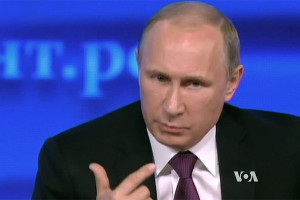Two New Signs Russians are Ceasing to Trust the Kremlin’s Messages

(Paul Goble – Window on Eurasia – Staunton, July 25, 2017)
In a lead article today, the editors of Nezavisimaya gazeta say that for the first time fewer than half of all Russians say they trust government TV in large part because the economy and its problems are the primary focus of Russians in their everyday lives but the last thing the media attend to (ng.ru/editorial/2017-07-25/2_7036_red.html).
And in a Rosbalt commentary, Lyudmila Semenova, a specialist on art, says that Russians are standing in line, often for long hours, to view the relics of saints at least in part because having something to believe in is important to them and “they no longer have any faith in the government” (rosbalt.ru/blogs/2017/07/24/1633097.html).
These are the latest indications that despite the self-confidence Vladimir Putin projects about the trust and support he believes he has among the Russian people, in fact, as the economic crisis deepens and ever more Russian citizens are forced to confront declines in their standard of living, their faith in him and what his propagandists say is ebbing away.
The editors of Nezavisimaya gazeta point out that surveys of Russian public opinion now present “a paradoxical picture.” On the one hand, they find that Russians are agitated “above all by economic problems.” But on the other, when Russians are asked what they want to see in the media, Russians say they are interested in economic issues least of all.
There are several possible explanations for this divergence, the editors say. Russians may simply want to see something different in the media than they see in their daily lives. Or the media may not have figured out how to cover such things in an interesting way. Or “government propaganda may form the information agenda for Russians.
But in addition, the editors say, Russians indicate now that they trust the media much less than they used to. “About 40 percent of Russians” are now certain that the media isn’t objective, nearly twice as many as said this three years ago. And as a result, “the share of those who call the Russian media objective is only seven percent more than the share who have the opposite view.”
And as for television, the most important “mass informer” of the population, a June poll found “for the first time” that trust in its broadcasts had fallen before “the red line” of 50 percent of the population. In all earlier years, more than half of the Russian people trusted television; now, fewer than half do.
In her commentary, Semenova suggests that Russians are ready to stand in line to see the relics of Orthodox saints because they want some form of entertainment and can’t afford anything else or because they hope that the relics will provide them with some relief from this or that problem they are suffering with.
But there is another reason which may be even more important, the specialist on art says. When the government doesn’t support the population and can’t even come up with an image of “a bright future,” Russians begin to search for some basis independently – and in this case, by turning to religion.”
Consequently, while the authorities may continue to issue optimistic reports and upbeat television stories, “part of the people will stand in lines for many hours to view the remains of imported saints Some because they sincerely believe that this will bring them help, but some simply because that’s what ‘everyone is doing.'”
[Article also appeared at windowoneurasia2.blogspot.com/2017/07/two-new-signs-russians-are-ceasing-to.html]
